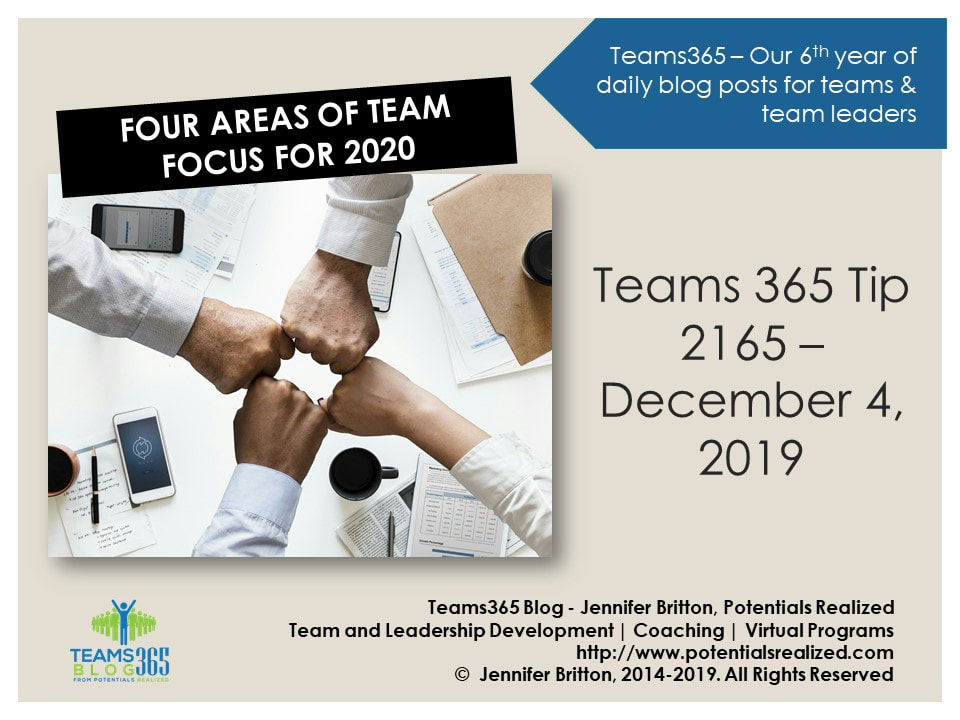As a team, it may be useful to invest time focusing on revisiting or discussing:
#1 - Our Ways of Working/Team Agreements: What are the norms and ways we work together? What’s acceptable? What’s not?
A reminder that much of the recent research, including Google’s project Aristotle, has validated what many of us as team practitioners have been doing for years – helping teams articulate HOW they want to operate. What’s acceptable and what’s not on a team?
#2 – Our Vision: Vision helps us move through the ups and downs of business. When things are changing at the micro-level, our vision may become more static, and can act as a guidepost. What are you doing to revisit your vision? How aligned is everyone around the vision? Does everyone see how they fit into the vision and how they contribute? Note that the time window around vision may be shorter than it was – rather than focusing on a 10-year window it may be 36-month vision.
spending a few minutes as a team at year end to reconnect around what your vision is for the upcoming year can be a valuable exercise.
I wrote more extended posts around working with vision back in 2015, and here are some of the questions I included at that time for discussion as a team in Teams365 #366. Here are some of those questions I included at the time:
Before you get back to work for the year, spend a few minutes reflecting on these key questions for your 2015 goals:
- What are your key goals for the next year - personally? As a team?
- On a scale of 1-10, how easy are these goals? Which ones are going to be the most stretch?
- What will keep these goals at the forefront for you this year?
- How do you want to track them? What are key milestones along the way?
- What do you need in order to achieve them (people, resources, finances etc)?
- What are you committed to achieving this next year, no matter what?
- How do your individual, team and organizational goals align?
- Who will you be accountable to?
- How will you celebrate them along the way?
Take time to write these down in a place you can refer back to. When you get back to work, share and discuss these with your team members, those you collaborate with, and other stakeholders.
#3 - Systems and Processes become important given that we may need to shift our role even more. When we leave a role often our knowledge leaves with us. Savvy leaders know the importance systems and process play in helping to build on the learning that people bring. Even if they are moved to a new project, good systems and processes will help capture the learning.
#4 – Relationships. As I write in my latest work around Remote Pathways, “no person is an island”. Relationships play a critical role for team members, especially in the remote space. Remote does not equal disconnected. What are you doing to bring people together regularly to build trust and connection? With low levels of trust, it’s likely that people will not be willing to bring their best self to work. With low levels of trust, it’s unlikely that the big issues will be surfaced. When people do not feel connected, it’s also unlikely that the real issues get surfaced. We want to make sure we help team members, especially remote team members, see their connections with each other.
For more on trust, check out this earlier Teams365 blog post and related cartoon around 9 different ways to build trust or Teams365 1512 for Building TRust in a virtual team.
Check out this blog post on creating connection and building community across the team.
Enjoy your conversation!
Jennifer
Potentials Realized | Coaching Team Leaders | Remote Pathways Podcast
Team and Leadership Development | Coaching | Writing
Phone (416)996-8326
As we step into the end of the year, get your planning on with the PlanDoTrack Workbook and Planner or Coaching Business Builder
Looking to enhance your virtual conversations? Webinars? Pick up a copy of Effective Virtual Conversations at Amazon.

 RSS Feed
RSS Feed





